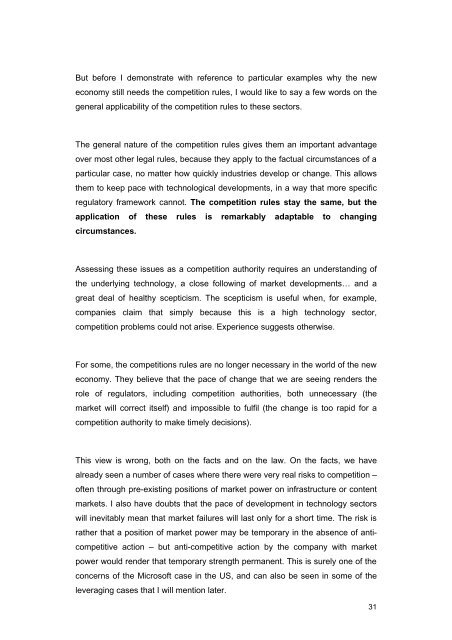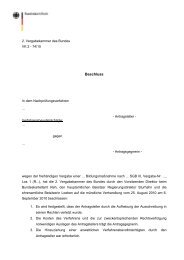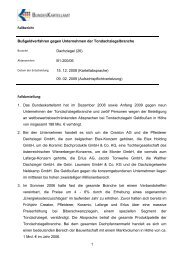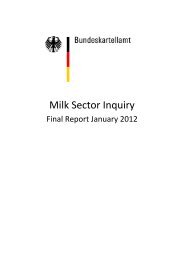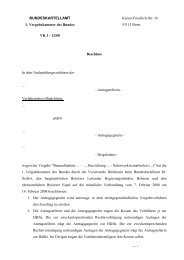21. und 22. Mai X. Internationale ... - Bundeskartellamt
21. und 22. Mai X. Internationale ... - Bundeskartellamt
21. und 22. Mai X. Internationale ... - Bundeskartellamt
Erfolgreiche ePaper selbst erstellen
Machen Sie aus Ihren PDF Publikationen ein blätterbares Flipbook mit unserer einzigartigen Google optimierten e-Paper Software.
But before I demonstrate with reference to particular examples why the new<br />
economy still needs the competition rules, I would like to say a few words on the<br />
general applicability of the competition rules to these sectors.<br />
The general nature of the competition rules gives them an important advantage<br />
over most other legal rules, because they apply to the factual circumstances of a<br />
particular case, no matter how quickly industries develop or change. This allows<br />
them to keep pace with technological developments, in a way that more specific<br />
regulatory framework cannot. The competition rules stay the same, but the<br />
application of these rules is remarkably adaptable to changing<br />
circumstances.<br />
Assessing these issues as a competition authority requires an <strong>und</strong>erstanding of<br />
the <strong>und</strong>erlying technology, a close following of market developments… and a<br />
great deal of healthy scepticism. The scepticism is useful when, for example,<br />
companies claim that simply because this is a high technology sector,<br />
competition problems could not arise. Experience suggests otherwise.<br />
For some, the competitions rules are no longer necessary in the world of the new<br />
economy. They believe that the pace of change that we are seeing renders the<br />
role of regulators, including competition authorities, both unnecessary (the<br />
market will correct itself) and impossible to fulfil (the change is too rapid for a<br />
competition authority to make timely decisions).<br />
This view is wrong, both on the facts and on the law. On the facts, we have<br />
already seen a number of cases where there were very real risks to competition –<br />
often through pre-existing positions of market power on infrastructure or content<br />
markets. I also have doubts that the pace of development in technology sectors<br />
will inevitably mean that market failures will last only for a short time. The risk is<br />
rather that a position of market power may be temporary in the absence of anticompetitive<br />
action – but anti-competitive action by the company with market<br />
power would render that temporary strength permanent. This is surely one of the<br />
concerns of the Microsoft case in the US, and can also be seen in some of the<br />
leveraging cases that I will mention later.<br />
31


